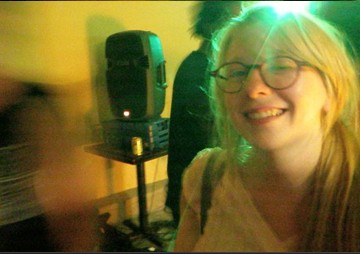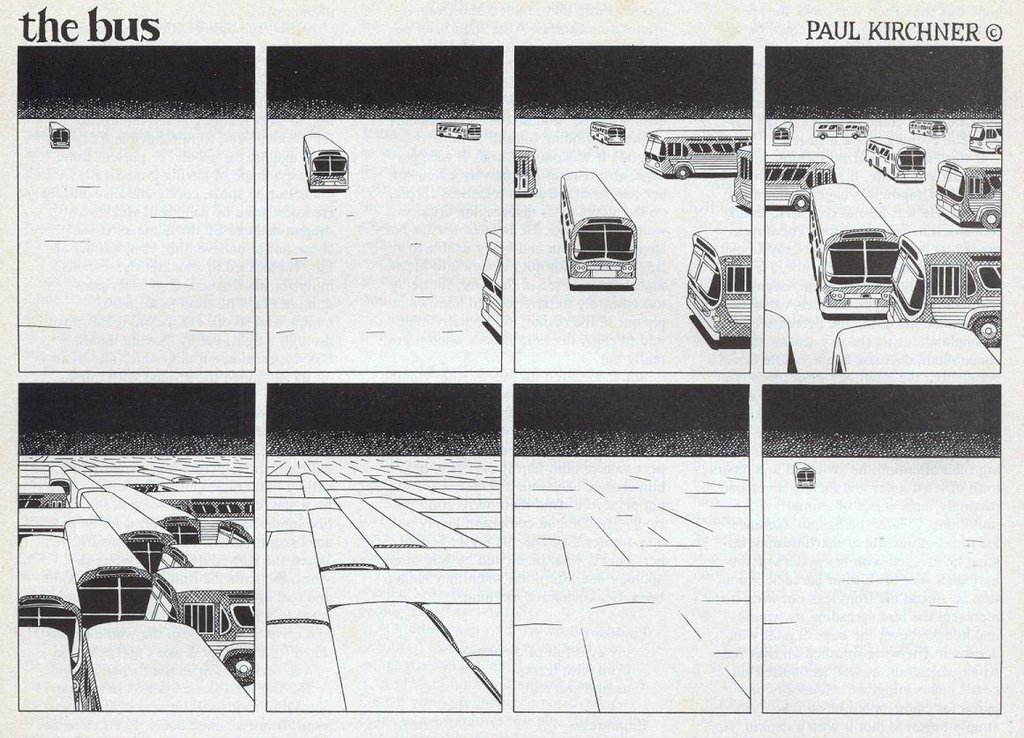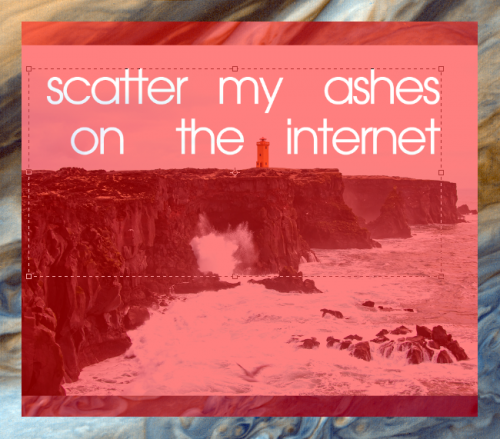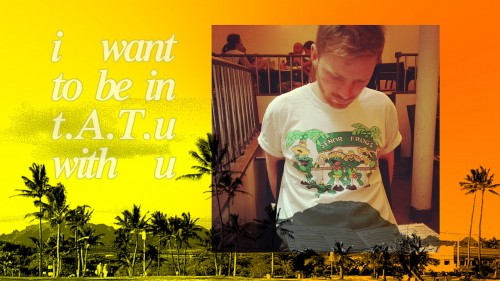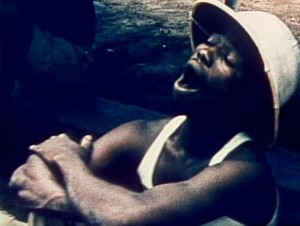Andrew Durbin: Ari Spool for Mayor of New York
If you’re like me and you don’t vote, you probably don’t do it out of dissatisfaction with our current democratic process (though there’s that, duh), you probably do it because you’re lazy, a fact a little at odds with your interest in radical politics. Those lines, those leavers… all those opportunities for fraud (outside the fraud of the entire financial system that makes it possible in the first place), I just can’t. I don’t think not voting is radical; I think it’s a simple disapproval of the way things are done and, really, a real distaste for a line that doesn’t end in free pizza. I’m the ambivalent non-voter. I’d like to see Big Change, but not Barack Obama’s brand (more like the, um, Communist–or Commonist–brand). I’m voting for Ari Spool because I’m a Commonist, really, and I think Ari is too, because common to us all is a kind of ambivalence that really sets her apart from the rest of the field, a plucky, aggressive little group that includes Bill de Blasio whom, of course, I kind of like. I like his wife more, but she’s not running for mayor. Lhota, de Blasio: they just want to win too much. It’s a bad look, face it. They want to live in a mansion and get cozy with all the people that make the rest of us lose our lunch. I’m voting for Ari because I don’t think Ari cares about Business, Big or otherwise, I think Ari cares about art. I’m voting for Ari Spool because I want more art and you should too. Art in the streets, art in your apartment. Art should replace money. Art should be everywhere, right? I also think Ari’s election night party, whether she wins or loses, will be better than de Blasio or Lhota’s combined. See you there?
Interview with Christine Lee Zilka and Jennifer Derilo of the Kartika Review
I’ve always been curious about the darkroom where literary magazines come together. This is a series of interviews engaging, talking, and sometimes annoying editors about their magazines. How did they come about, what do they hate about editing, and what do they love most about it?
This is the third in the series and I talked with Fiction Editor, Christine Lee Zilka, and Creative Nonfiction editor, Jennifer Derilo. Their about page has the following description: “Kartika Review is a national literary arts magazine that publishes Asian Pacific Islander American fiction, poetry, creative non-fiction, and art. Kartika Review serves the Asian Pacific Islander American (APIA) community and those involved with Diasporic Asian and Pacific Islander-inspired literature. We scout for compelling APIA creative writing and artwork to present to the public at large. Our editors actively solicit contributions from established virtuosos in our community in hopes their works here will inspire the next generation of virtuosos. Kartika also promotes emerging writers and artists we foresee to be the future powerhouses of their craft. Ultimately, Kartika strives to create a literary forum that caters to and celebrates the wordsmiths of the Asian Diaspora.”
What’s always drawn me to the review is their focus on great stories. The APIA experience is incredibly diverse and the Kartika Review pushes the boundaries of what constitutes APIA literature. The settings may differ and so may some of the sentiments of the narrators, but at the core, the emotional resonance transcends any differences. The tales, poetry, essays, and imagery form a unique flotilla of art that is as portable as it is relatable. I hopped on board with the two editors and what followed was an organic and fun trek through the editorial rivers of the review.
***
As a brief bio and introduction to Christine (CLZ) and Jennifer (JD):

Christine Lee Zilka is the Fiction Editor at KARTIKA REVIEW. Her work has appeared in journals and anthologies such as ZYZZYVA, GUERNICA, VERBSAP, HYPHEN, and MEN UNDRESSED. She has a novel in progress.

Jennifer Derilo is the Creative Nonfiction editor at Kartika Review. She has a memoir in progress. She often has nightmares about zombies. And abandoned predicate parts.
***
PTL: When and how did you first get involved with Kartika Review?
CLZ: I subbed a short story for consideration to Kartika in early 2008–and I got an email from Sunny Woan, our Founding Editor, saying she loved the piece and wanted to know if I would be interested in becoming Kartika’s Fiction Editor (the previous Fiction Editors departed after Kartika’s second issue). I told her yes! It was my call whether or not to have the piece published; I’m not a big proponent of editors publishing their own work at the litmag for which they work, so I withdrew the piece. The rest is history. I found a passion project in Kartika Review and a fantastic friend in Sunny. And recently, that story just got accepted for publication in another litmag. I owe a lot to that story.
JD: Christine and I were in the MFA program at Mills, but she was in the cohort ahead of me. I first met her when she was the TA for a teaching pedagogy class during my first semester in 2006. While she was an excellent TA, she also coaxed me out of my shell. I started to see her as a big sister type who had the best advice about classes, professors, the program itself, and eventually writing. We kept in touch after we both graduated (I kept going to her for advice!), and then sometime in 2008, Christine asked me to submit something to KR, but in true Jenn Derilo fashion, I never did. And then in 2009, she asked me to join because the CNF editor before me was moving onto other things. I’m sorry for all that backstory about my friendship with Christine, but if I didn’t initially glom onto her (ok…that’s not supposed to sound as creepy, stalker-ish, aggressive as it might), I don’t know that I would ever have been exposed to KR. I was such a writing/literary n00b when I started Mills, and I certainly knew nothing about APIA literature. But she talked about Kartika with such passion, and I was so impressed with the work they were doing, I couldn’t not join. I was supremely honored.
CZ: Jenn is modest. She’s an awesome writer. And has done amazing things as an editor at Kartika.
JD: Aw, shucks. Thank you. I’m lucky to be on an editorial board with multi-talented women of color. And I can’t stress that enough: women of color.
PTL: Christine, I really liked it when you said in regards to your editorial selections: “I often pick pieces by Asian Americans that aren’t API-centric. There are no rules, and Naomi Williams breaks them with brilliance.” What are some works that you both think exemplify Asian Pacific Islander American (APIA) literature, and how did those works affect and influence you?
CLZ: Twenty years ago, this question would have had a more clear cut answer. I would probably have said Maxine Hong Kingston’s WOMAN WARRIOR or Chang-rae Lee’s NATIVE SPEAKER. To that end, I’m motivated both as a writer and as an editor to broaden APIA literature. I’m happy to say there’s no single work that stands out to me, anymore. And I’m also happy that I’m a gatekeeper who gets to have a hand in diversifying the pool. I’m in front of a verrrry small gate, but it’s a gate, nonetheless.
JD: While I know this question is directed at Christine, I can’t help jumping in and agreeing with her, especially given that my knowledge of APIA literature was limited before joining KR. I even knew little about the APIA cannon. But what we do at KR is different. I do feel like we’re “diversifying the pool”, such as including the work of emerging writers alongside interviews with household names. We aren’t only publishing APIA writers who engage with APIA themes. I think Christine nails it when she says, “I’m happy to say that there’s no single work that stands out to me, anymore.” I mean, wow. What a brave discovery to voice! This is not to say that no submissions stand out because, clearly, we publish those pieces shake us. What’s important about that statement is that no one work encapsulates, defines, pigeonholes APIA literature. Rather each work broadens this scope.
PTL: I love the definition of “Kartika” as mentioned on the site: “In Vajrayana (or Tibetan) Buddhist tradition, the kartika, a crescent-shaped knife, symbolizes the cutting away of ignorance and superficiality, with the hopes that it will lead to enlightenment.” What are some themes and elements you both look for in the selections you make for short stories and non-fiction essays?
JD: I don’t know if this is cliche, but I’m attracted to creative nonfiction that surprises me. Even if submissions are about common themes, if the approach to language, structure, or voice is undeniably fresh or risky, I quickly gravitate toward them. It’s difficult to pinpoint exactly what floors me. The best way to understand my madness is to read our back issues starting with #6, which is, of course, when I joined.
CLZ: When I’m looking through the slushpile, pieces tend to blur into each other—so I too, am looking for something different. I’m looking for stories that hit something out of the ballpark, be it concept, structure, language, or ultimately, story. What haven’t I seen before?
The Bus by Paul Kirchner
The Bus ran monthly in Heavy Metal from 1978 to 1985.
Imgur has hosted as a bunch of strips. Below are two.
The Bus rules.
COLLECTED ALEX
“Always keep your dead body close, my parents told me.”
A.T. Grant wrote a novella called Collected Alex. Caketrain [a journal and press] put it in a dark boat. Now you can tie it to your dock using some rope and an animal bone of a kind. A.T. Grant is a thick bag of fire, a cake you should feed to the zombie geese.
[Film vignette by Katy Mongeau]
Anonymous Response to Sandra Simonds’s Open Letter to The Poetry Foundation
To Sandra Simonds,
This is an open letter in response to your request that the Poetry Foundation make a strong financial commitment to aid poets facing financial crises and a lack of adequate healthcare.
You say in your open letter that “it is heartbreaking when poets you have admired for years are forced to ask for help with basic necessities,” and I wonder how this is any more heartbreaking than the millions of other Americans struggling financially to make ends meet. How do the struggles of everyday Americans differ, and to what degree, from those problems faced by the poetry community? As poets, we make a decision at some point or another to devote as much of our life to our craft as possible. In doing so, we must acknowledge that to identify as a poet (or artist in general) is a privilege in and of itself; one that comes at certain costs. Primarily, a life of potential financial hardship. But I ask you, Sandra, what American today does not face similar uncertainties facing their financial future?
The difference between poets and the general public is that some of us, like you, Sandra, are fortunate enough to have an audience and a platform to reach them. In today’s rocky economic climate, one governed by debt and political deficit, I do not think it is in the best interest of your audience or the poetry community to model such irresponsible behavior in asking for a financial handout from the Poetry Foundation to support the poets you hold in such romanticized esteem. Poets are people just like everyone else, Sandra. Suggesting that poets deserve compensation simply for the fact of being a poet is insulting, and furthers our reputation for being elitist and disconnected. As a community, I would hope that we had a little more gumption to solve our financial predicament rather than taking the easy route by asking the Poetry Foundation for a handout. I support poets by buying their books. Maybe we, as a community, can figure out how to get our art to a wider audience before we so hastily throw in the towel. READ MORE >
October 15th, 2013 / 8:18 am
…………Crispin Best………….
***
I am very pleased that Crispin Best is my 4th U.K. Spotlight. I’ve enjoyed just about everything I’ve seen or read of his. I am, simply put, a real fan. His tweets are a Ferrari. His website‘s a garage full of Lamborghini (samples of his excellent writing). And his Tumblr is one snazzy racing car after another. (what’s with all the sports car references?? — well, it’s between me and Crispin, eh!).
Crispin’s answers to my questions (my questions steeped in cutesy, showoff puffery and fluff) surprised me a bit like tender marble footsteps fit to baptize or decapitate a king and which knock (knock-knock) like a bronze Beowulf boat against his online personas which are so heroically abrasive (“hi, assholes“- etc), lovable, zany, magnetic, full of swagger and energy.
but, blah, blah, anyways,
.. here’s our interview, which you’d better enjoy! (assholes!)
***
Rauan: which would you rather be called: a “digital Ashbery” or a “Tumblr Catullus” (nothing i’m guessing with “Larkin” in it)? and what truth would there be in either ? (and plz elaborate like we’re at a party in Brooklyn, leaning against a fridge. or between two trees on a summery day in Oxford. Or in a pit. Anything.).
Crispin: i do know an old story about don barthelme telling his writers-blocked student to drink a bottle of red wine and spend all night writing imitations of ashbery, phoning at 4am to check up on them, and how that helped the student. i feel a strong, sad warmth towards don barthelme at all times, but particularly when i think about that story. i like the sound of a tumblr catullus. that seems appealing. mostly i’m happy to be alive. it’s hard and it’s hell but it’s good.
[ the Senor Frogs T-Shirt, fyi, was a shrewd $2 purchase in Tokyo ]
***
RK: beyond your excellent crude and funny persona(s) you seem able to find and show in your heart many beautiful READ MORE >
organizers of the petition asking the Poetry Foundation to do more to help poets in need plan on visiting the Poetry Foundation in person soon to show the Foundation and its board how much community support they’ve got behind them.
and so they’re asking now for anyone sympathetic to the petition to please help spread the word by sharing on Facebook, tweeting, emailing, etc.
they have also created a Facebook Page which in less than 12 hours has received over 500 Likes !
Cunt Norton by Dodie Bellamy
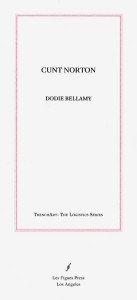 Cunt Norton
Cunt Norton
by Dodie Bellamy
Les Figues Press, November 2013
75 pages / $15 Buy from Les Figues Press or SPD
In Cunt Norton, Bellamy slices the canonical texts, lifts the raw skin, and slides all kinds of exciting things into the wound. Then she sews it back up. The result is a bulging, infested boil of sex and gender. The result is dirty love poems secreting out the orifices of our favorite fathers. (And one mother: Dickinson.)
Playing off of William S. Burroughs’ “cut-up” technique, Bellamy published Cunt Ups in 2001. Now she’s back at it, “cu(n)ting” up the 1975 Norton Anthology of Poetry. She selected thirty-three poets from the anthology and has re-imagined their texts: cutting and interspersing their words with hypersexual language. Poets ranging from Shakespeare to Ashberry still sound remarkably like themselves. They are recognizable—only sloppy with desire. Dripping wet.
The multi-gendered speakers in Cunt Norton end up sounding at turns psychotic, absurd, and boring—which comes pretty close to the actuality of sexual encounters and the language we use for desire. When the speaker in “Cunt Auden” says, “You be a good girl—I’ll take care of you—lay here in my hands with their many fingers. I’ve never ever given anybody help who didn’t come” (57), I want to barf at the sad, true, cliché of it. I feel the same with “Cunt Yeats,” which begins: “Gloom is in my mind, and I have to fuck you so bad. Good girl. Good girl” (40). “Cunt Blake” finishes with a hearty, “I poke out and in thee in so many places, the Air shreds to Rags and the Heavens tear” (21) and “Cunt Tennyson” promises to “fuck thy portal until mouths, foreheads, eyelids lose all boundaries” (35), both of which are equally hilarious and scary. I am reminded of all my worst sexual experiences.
Other pieces are full of rollicking, gender-bending, free-for-alls. Take, for example, “Cunt Frost:” “My clit stands still and dances—it looks huge, the outer lips filling the abyss’ void with emptiness. It cries out for you. […] My cock is normal size, ready to throw back without regret into your cunt or your large intestine” (43). The Great Men from the Norton Anthology are marionettes in Bellamy’s hands. Their reputations are at her disposal: their genitalia grow and morph, their gigantic desires never satisfied.
But Bellamy’s book is as much a political act as it is a book of poetry.
Let me offer an example why. Recently, after I participated in a reading, a fellow (male) poet asked me why I write about the same thing (sex) all the time. And why do I use such vulgar (cock, cunt, etc.) language? He suggested that I would get more publications if I varied my subject matter and cleaned up my language a bit.
Dodie Bellamy’s Cunt Norton exists as an answer to these kinds of questions. What I mean is: Dodie Bellamy is a woman who writes about sex. Who writes with verve and risk and imagination. Who isn’t afraid of language, or of dead white men, or the reverence we are supposed to have for them. Dodie Bellamy will not be silenced or ashamed. When Ariana Reines writes in the book’s introduction that this “could be the most joyful book on Earth” and it “made me feel so good I laughed so hard I cried,” what she may be articulating is how powerful it feels to witness a woman writing exactly how she wants to write, refusing to be silenced (by the canon, the patriarchy, any other poet’s aesthetic or ethical impulse).
October 14th, 2013 / 11:05 am
The Childhood of Jesus
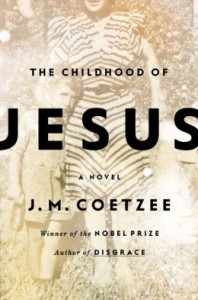 The Childhood of Jesus
The Childhood of Jesus
by J. M. Coetzee
Viking, Sept 2013
288 pages / $26.95 Buy from Amazon
As someone who has recently come to Australia, I find the reviews of Coetzee’s latest novel astounding. His early novels Life and Times of Michael K and Waiting for the Barbarians had readers and reviewers inferring the novels’ South African racial and historical specificities, with neither being identified in the books. Reviewers of The Childhood of Jesus, however, have mainly commented on the novels’ insular, literary and ageographical nature. Some reviewers have even gone so far as to say the novel is set in “an entirely Coetzeean universe” or a ‘Novel-land.’ Strangely, there has been an appalling lack of recognition of the book’s Australian context.
Reviews of most of Coetzee’s novels since he emigrated from South Africa to Australia have taken a similar tack. Many reviewers and critics have viewed his departure from Africa as being a departure from his usual themes of postcolonialism, nation and race. Coetzee’s speech given upon receiving citizenship seems to contradict this, with him saying very publically that in “becoming a citizen one undertakes certain duties and responsibilities.”
The Childhood of Jesus tells the story of middle-aged man, Simón, and young boy, David, who arrive by boat as immigrants in a Spanish-speaking country. Somehow in his previous life David lost his mother and on the journey to their new life Simòn vowed to help the child find her. Helped by the usual Coetzeean/Kafkan bureaucratic nightmare, the pair find accommodation, work and friends. In this new world, everyone seems to be an immigrant arriving by boat and none of them speak about their old lives.
Eventually Simòn finds a mother of sorts, Inés, for David and entrusts the boy to her care. Simòn continues to be heavily involved in the boy’s life and acts as a kind of teacher to him. David however is not a willing student and has entirely novel ideas on mathematics and language, getting him in trouble with school and eventually the state.
Reading Childhood during an election period shortly after I arrived in Australia may have made me more keenly aware of the novel’s Australianess. I appear to be almost alone in this thought though. After trawling through pages of reviews, I was staggered at the lack of writers connecting the novel to Australia’s current political and sociological position. A few reviews make the connection briefly but swiftly move onto discuss Coetzee’s high philosophical ideas.
One of the biggest areas of debate in past years in Australian politics has been the so-called “boat people”. Numbers of refugees arriving in Australian illegally by boat have dramatically risen in recent years – although the numbers are not big enough to warrant the size of the debate. Many of these are ethnic Hazaras fleeing Afghanistan (a country that Australia has a military presence in).
“Family reunions” is another hot topic in Australian politics. This is where refugees who are already within Australia apply to have their family members who have not yet escaped their country join them in Australia.
October 14th, 2013 / 11:00 am
TWOCLOSEWORDS: HAUNTING / HUNTING
(A scene from Les Maîtres Fous (The Mad Masters), a film by Jean Rouch)
Haunting –
My left eye is fucked. It isn’t the first time. I’ve mentioned its swollen episodes everywhere: in poems, on the phone.
Because I think it’s hysterical. Because I really can’t get over it.
LOLOLOLOL. A POET. WITH A SENSITIVE. EYEBALL. FUCK ALL THAT.
Lately, there are tiny, irritated dots that have been piling up in the corner. My roommate gives me clay and DMSO, which is HORSE LINIMENT. She dabs it on for me. The eye’s anger ebbs and flows.
I like that my own body keeps haunting me from this particular room, always from this left eye, trying to get me to deal with or acknowledge some part / stress deposit of myself that I’ve neglected / buried. Your own body interrupts you. It unexpectedly cuts you off. I feel more than slightly disembodied when I look at it in the mirror, when I touch it. Ghosts are red.

